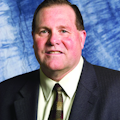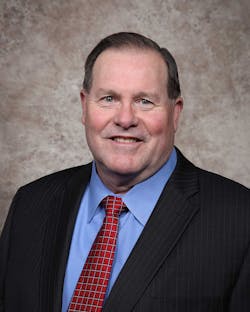Cancer Supplement: Survivor Story: Chief Dennis Compton
It was in July 2012 when I arrived for my annual physical. My blood work had been completed ahead of time, so I was all set to complete my physical that day and move along for another year. But fate had another plan.
Although I wasn’t experiencing any symptoms or problems, my doctor was concerned about one of my lab results, so he suggested that I follow up with a specialist. The test result that drew his attention was actually within the “normal range,” but it was elevated compared to my physical a year earlier.
My initial evaluation with the specialist was in August, and he found a small tumor. He too was somewhat (but not significantly) concerned, and scheduled a biopsy in September just to be as thorough as possible. The results of the biopsy came back a few days later and, of course, I received a follow-up phone call from the specialist. I was taken by surprise when he began to explain that I had cancer and would require intervention—sooner rather than later. Seventeen of the 20 needle biopsies he had taken came back from the lab as malignant.
During the next couple of months, it was literally one test after another, as my wife, family and I prepared for what we knew would be an invasive surgery and a long process. That surgery took place on Dec. 12, 2012. I was down for the count for about a month and a half, but thought I would bounce back quicker than most. But I was wrong. My surgeon said it could take as long as a couple of years before I was back to my normal self. I admit that I scoffed at his prediction, but he wasn’t that far off. I was active during that recovery time, but didn’t have the energy or stamina I had previously enjoyed.
So on I went into the cycle so many other cancer patients I knew had gone through in one form or another. For the first three years after surgery, I was screened every 90 days. The next two years, the screenings were every six months. Now, after recently completing my five-year cancer screen, the cycle will be once a year for the rest of my life.
There aren’t any signs that I have cancer at this time, and for that, I am truly blessed. I think everyone gets a little anxious when it’s time to go in for their scheduled cancer screen, and that was heightened when my very first screen after surgery (March 2013) was a false positive. It took a while to confirm the “false” part of that result, which was difficult on me and my wife. We chose not to tell the rest of the family until the test could be re-administered and the results confirmed. Thank God I was clear.
I consider myself one of the fortunate ones (so far) when it comes to my cancer experience. The course of action we selected (although radical) seems to have been the right decision. The support my wife and I had from our family, friends, doctors, hospital staff, the Phoenix and Mesa fire departments, as well as both unions, the National Fallen Firefighters Foundation (NFFF), the International Fire Service Training Association (IFSTA), the Congressional Fire Services Institute (CFSI), and the fire service as a whole, was incredible. The cards and emails wishing me well meant a lot—and the prayers provided by so many were heartwarming. It was more than anyone could have ever asked for, but that’s the fire service! We don’t necessarily expect all that support, but we sure appreciate it!
Like so many firefighters I know who have been diagnosed with cancer, mine was found during an annual physical. Again, I was not experiencing any symptoms. In fact, I didn’t begin to have symptoms until just a couple of weeks before my surgery.
As the research continues to show, the rate of certain cancers is significantly higher in firefighters than within the general public. We in the fire service need to do all we can to prevent exposures, train our firefighters and provide a means for them to be monitored annually for occupational diseases (such as cancer) throughout their careers, and even into retirement.
Once a person is diagnosed with cancer, life as they knew it changes. It’s not only a life-threatening experience at the time, but the road ahead, with all the tests, surgeries and treatments, can be very difficult as well. I’m not sure you ever get over cancer, because even when it’s no longer in your body, it remains in your memory, concerned that it might return.
But I found that there is good that came from my cancer experience. Life is more precious; time has more value; love is more treasured; friends and family are more appreciated; priorities seem to have shifted; and the definition of what constitutes a “big deal” definitely changes. I love life, but I hate cancer!
About the Author

Dennis Compton
Chief
DENNIS COMPTON is a well-known speaker and the author of several books, including his most recent offering titled Progressive Leadership Principles, Concepts and Tools. He also authored the three-part series of books titled When in Doubt, Lead, the book Mental Aspects of Performance for Firefighters and Fire Officers, as well as many articles, chapters and other publications. Compton was the fire chief in Mesa, AZ, for five years and an assistant fire chief in Phoenix, where he served for 27 years. He is past chairman of the Executive Board of the International Fire Service Training Association (IFSTA) and past chairman of the Congressional Fire Services Institute (CFSI) National Advisory Committee. Compton is currently the chairman of the National Fallen Firefighters Foundation (NFFF) Board of Directors and co-chairs the Fire Service-Based EMS Advocates Steering Committee.
